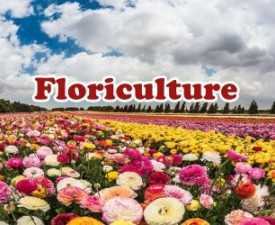Description
Course Name: Professional Certificate in Floriculture
Course Id: CFT/Q1001.
Eligibility: A high School (10th grade) or equivalent is required.
Duration: Two Months.
Objective: The Professional Certificate in Floriculture course is designed to provide individuals with comprehensive knowledge and practical skills in the cultivation, management, and marketing of flowers and ornamental plants. This course aims to support employment and entrepreneurship in the fast-growing floriculture industry.






Debit/Credit Card, Wallet, Paytm, Net Banking, UPI, or Google Pay.



• A soft copy (scanned) of your certificate via email within 7 days of examination.
• A hard copy (original with official seal and signature) sent to your address within 45 day of declaration of result.

Online Examination Detail:
Duration- 60 minutes.
No. of Questions- 30. (Multiple Choice Questions).
Maximum Marks- 100, Passing Marks- 40%.
There is no negative marking in this module.
| Marking System: | ||||||
| S.No. | No. of Questions | Marks Each Question | Total Marks | |||
| 1 | 10 | 5 | 50 | |||
| 2 | 5 | 4 | 20 | |||
| 3 | 5 | 3 | 15 | |||
| 4 | 5 | 2 | 10 | |||
| 5 | 5 | 1 | 5 | |||
| 30 | 100 | |||||
| How Students will be Graded: | ||||||
| S.No. | Marks | Grade | ||||
| 1 | 91-100 | O (Outstanding) | ||||
| 2 | 81-90 | A+ (Excellent) | ||||
| 3 | 71-80 | A (Very Good) | ||||
| 4 | 61-70 | B (Good) | ||||
| 5 | 51-60 | C (Average) | ||||
| 6 | 40-50 | P (Pass) | ||||
| 7 | 0-40 | F (Fail) | ||||







Syllabus
Introduction to Floriculture: Overview of floriculture and its importance, History and evolution of flower cultivation, Scope and career opportunities in floriculture, Classification of flowers – seasonal, perennial, and ornamental, Major floriculture crops and their economic value, Role of floriculture in landscaping and decoration, Global trends and market demand for flowers, Sustainable floriculture practices, Basic botanical concepts related to flowering plants, Importance of quality standards in floriculture.
Propagation Techniques in Floriculture: Methods of propagation – sexual and asexual, Seed propagation and germination techniques, Vegetative propagation – cutting, grafting, layering, and budding, Micropropagation and tissue culture techniques, Soil and media preparation for propagation, Growth regulators and their role in propagation, Nursery management and care for young plants, Pest and disease control in propagated plants, Hardening of plants before transplantation, Tools and equipment used in propagation.
Soil and Nutrient Management for Flower Crops: Importance of soil health in floriculture, Soil types and their suitability for different flowers, Soil testing and nutrient analysis, Organic and inorganic fertilizers for flower crops, Fertilization techniques – basal, foliar, and drip irrigation, Composting and organic soil amendments, Soil sterilization methods to prevent diseases, pH and salinity management in flower cultivation, Mulching techniques for moisture retention, Crop rotation and intercropping in floriculture.
Greenhouse and Protected Cultivation: Types of greenhouses and their structures, Shade net houses and polyhouses for flower production, Temperature and humidity control in greenhouses, Ventilation and shading techniques, Hydroponics and soilless cultivation methods, Drip and mist irrigation systems, Pest and disease management in controlled environments, Cost-effective greenhouse construction techniques, Advantages of protected cultivation in floriculture, Government schemes and subsidies for greenhouse farming.
Commercial Flower Cultivation Practices: Selection of flower varieties for commercial production, Land preparation and planting techniques, Seasonal and perennial flower crop management, Irrigation scheduling and water management, Weed control methods in floriculture, Use of plant growth regulators for better yield, Harvesting techniques for different flowers, Post-harvest handling and storage, Grading and packaging of flowers, Export potential and quality standards for commercial flowers.
Pest and Disease Management in Floriculture: Common pests affecting flower crops, Biological control methods for pest management, Integrated Pest Management (IPM) strategies, Identification and control of fungal, bacterial, and viral diseases, Use of organic pesticides and eco-friendly solutions, Importance of crop rotation in disease prevention, Precautionary measures to prevent disease spread, Common physiological disorders in flowers and their remedies, Safe handling and application of pesticides, Government guidelines on pesticide use in floriculture.

